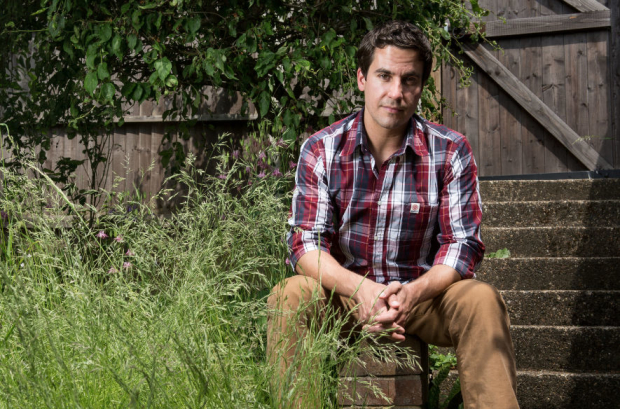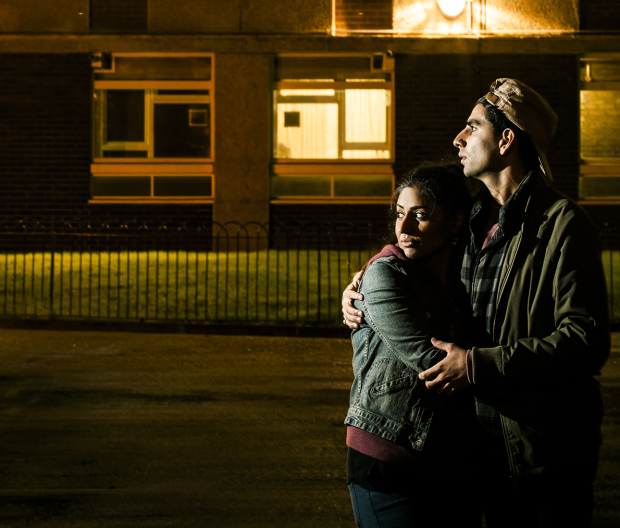Changing of the Guard: Tamasha's Fin Kennedy
We talk to the new artistic director of the cross-cultural touring company with credits ranging from ”East is East” to ”Snookered”

Playwright and producer Fin Kennedy has been a Tamasha associate artist since 2011, and in 2013 was appointed co-artistic director with founder Sudha Bhuchar. He recently took sole charge and has just produced the company's major production for 2015, Emteaz Hussain's Blood. His credits as a writer include the award-winning How To Disappear Completely And Never Be Found, Unstated, We Are Shadows, Locked In and Protection.
How did you get into theatre in the first place?
I studied Drama and English at Manchester University, where I wrote my first full-length play. I submitted it for a Royal Court competition, and got a runners-up prize, which was really exciting because I got to come down to London and sit in rehearsals, and it felt like being part of something. After I graduated I did a lot of jobs in theatres, from admin to front of house and backstage, which in hindsight was great training for a playwright. My big break really was getting a bursary to do the MA in Writing for Performance at Goldsmiths. The final project for that was a full-length play, which got produced at Soho Theatre in 2003. It was a play about social workers called Protection, and it helped me develop quite a research-led process; I like to get involved in subjects at a remove from myself. It set me on a path to writing about more diverse communities.
When did you first work with Tamasha?
Through my work at Soho Theatre I developed a parallel career teaching playwriting when they asked me to teach their 14-18 group. That led me to writing and working on plays with inner-city London teenagers, and one of the schools I worked with was Mulberry School for Girls in Tower Hamlets. In 2006 they recruited me as a playwright-in-residence, which was a pioneering thing for a state school to do. This led me to Tamasha, because in 2010 the specialist schools scheme, which paid for my salary at Mulberry, got cut. At the same time Tamasha was advertising for associate artists, so I rang them up and suggested running a playwrights-in-schools training scheme, which would involve writers coming to train with me at Mulberry. They said yes, and the following year eight Tamasha artists came and worked with the students over a term. They created a series of plays that were put on at Soho Theatre. This became what is now Schoolwrights, which is the UK's first playwrights in schools training scheme. And in the middle of all that I applied to become Tamasha's artistic director.
Why did you want to become artistic director?
It was an opportunity to have an infrastructure. I'd developed quite a few strands of my work as far as they could go, Schoolwrights being an example, and becoming artistic director of Tamasha allowed me to take them further. I'm really passionate about creating opportunities for other artists, so one of the first things I did at Tamasha was found a new writers group, which I hope might create a pool of talent we can then represent. I've also established a radio strand with a similar intention. I've had to become entrepreneurial throughout my career, and it's been great to bring some of that to Tamasha at a time when new ideas and structures are so important for companies to survive and thrive.
Could you give us an overview of the company's work?
The core work is national tours. We do one per year, which usually involves three weeks in London. That's the spine on which we hang other projects. For example, around our current tour of Blood we're developing Taxi Tales with Ishy Din. Ishy, who wrote Snookered for us, was originally a taxi driver in Middlesbrough, and we came up with this idea that he could work with other cab drivers to come up with monologues they can perform to customers in the back of their cabs. It's a whole new way of working for us, and hopefully by the time that show is ready I'll have a crack team who can replicate the model in other towns across the UK. We always produce new plays, and we now ask the playwright of each one to be involved in the surrounding outreach projects. So it's all about using the main work to feed back into the other strands. Tamasha's founding ethos of being a company to champion British Asian artists and stories has evolved and widened over the years, and in 2011 it changed its mission statement to be more cross-cultural.

Tell us more about Blood?
Like most of our plays it has a long history, because we nurture our artists long term. We produced Emteaz Hussain's first show Sweet Cider at the Arcola in 2008. Blood is her second play for us and her first national tour. It was originally conceived as a response to the 2011 London riots, and a real anger about how inner-city young people were being portrayed in the media. But rather than respond with a political polemic, she wanted to write a much more tender play about these people's lives. It's a love story set an east Midlands Pakistani community, about two 19 year-olds who meet and fall in love at college even though their families have other plans. It's loosely inspired by Blood Wedding, though it's certainly not an adaptation. It's about young people having life choices made for them, and the fall-out of that. It's very lyrical and beautiful and does a really sensitive job of portraying the emotional lives of young people who are usually stereotyped.
How do you rate your predecessor's tenure?
We got to know each other quite well because for 18 months we worked as co-artistic directors. Tamasha is very much Sudha and Kristine [Landon-Smith]'s baby. The company was born out of their friendship in the first instance, and an observation that they weren't seeing themselves on stage. So it was founded on love and politics, which really appeals to me as those things have always been at the heart of my work. The profile they built up for Tamasha has meant the company has punched above its weight for 25 years. It's a slightly scary privilege to have that as an inheritance, but also a great gift as well.
With an election imminent, are you at all worried about future funding?
It's always hard, and I've been heavily involved in lobbying over the last few years. The economics of small scale touring have always been nearly impossible. Even in times of economic abundance, it can't really exist without subsidy. It's to do with the size of the auditoria; in 100-150 seat theatres, the work is never going to wash its face. And our funding's currently on standstill, which is a cut in real terms, making it even harder. You're constantly on a fundraising treadmill, even though the Arts Council cover most of our core costs. We always have to co-produce now, which is not necessarily a bad thing as it can lead to interesting opportunities. But it's just a fact that if you're going to be a successful artist or company these days you have to be very entrepreneurial.
What's your overriding vision for the company?
In terms of the activity we undertake, artist and audience development are key, alongside ongoing lobbying and advocacy. In terms of philosophy, one of the ideas I brought to the job was the notion of cultural fault lines being an interesting location for Tamasha to make work. This was born out of my teaching, where I'd ask students about the fault lines in their work – in other words what are the big tectonic forces underlying it, and how do they meet to make interesting drama? In terms of Tamasha's work, I'm interested in seeing how the cultural fault lines in the UK can be represented in our work. How do big social forces influence individual lives? We've got an upcoming play, for example, called Mother India, which is about where global capitalism meets human reproduction. I want to keep developing plays that are about more than just themselves. We're in a time of profound social change, and Tamasha is very well placed to respond to that with real authenticity.
Blood runs at Soho Theatre from 28 April to 17 May as part of its UK tour. For more information, visit www.tamasha.org.uk













